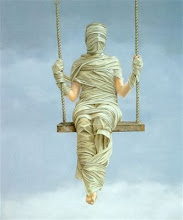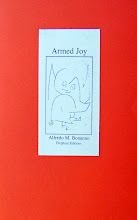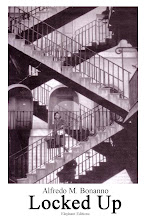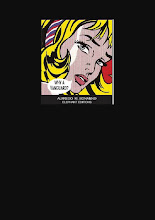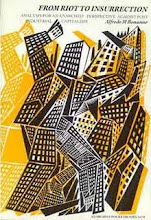LIFE AND DEATH
We must muster our strength and respond, respond to the hideous cavaliers of the apocalypse appearing on the horizon under a spring sky in fancy dress: clowns, ballerinas, even in workers’ overalls.
We must arm ourselves and be ready to respond in a not just adequate but excessive manner.We cannot guffaw louder than the guffaws of a clown, we cannot make a more agile piroette in front of the legs in movement of a ballerina followsing the music with perfect timing. Nor can we remind the betraying worker of having repudiated his class consciousness, as for a long time now there has been neither consciousness nor class.
Respond we must, but differently.
Once we thought the enemy wore the black clothes of the fascist, signs of death and battle to the last drop of blood, now we discover he just has the suspicious and rather surly, but only a little, face of the next door neighbour. Pennant with skulls and hobnailed clubs are no longer the trappings of the horsemen advancing on a horizon devoid of forboding stormclouds.
They don’t advance in compact lines, but in sparpaliate formations, they don’t recall at all the military spirit that they should and perhaps do still have, but that conceal it well under pacche paciose and condivisible projects. It is not race that camps in their discourse, but only fear of the illegal immigrant, not the different in skin but those who don’t have their papers in order, don’t have a job and don’t agree to obey the rules of the game, to courteously give way to the comfortable included or those aspiring to be such, carry their chains agilely, not letting them klink too much, waiting patiently for the necessary certificates to become ‘negri di cortile’, indispensable last reserve of the immense army of exploited.
It is no longer theories that leave marks of the whip on the back, the theory of dominion and the sign of God in whose name the infidels were to be defeated, but civil cohabitation, zebra crossings, recycle bins and differentiated collections. Whoever doesn’t enter this order of ideas has had themselves put out alone, does it for a residual of class consciousness (which reminds one more than anything of the tenebrous affairs of red riding hood and the wolf), or simply because he didn’t succeed in finding a piece of paper that legalises his situation with slave labour in time, it doesn’t matter: it’s sufficient not to find oneself on the wrong side side of the double white line, and you’re fired.
Who fixes these rules if not politics? Or, rather, the dissenati and sconci automats that rivestano political functions democratically conceded to them by the supreme popular will? But how is that possible if politics has had a coronary collapse and been put in a pharmacological coma?
In fact signals did reach us of this serious vital carenza of a now pluricentenarian monster, once firey aggressor of earthly and heavenly powers, today an ectoplasm with respiratory problems. And they were strong signals. From every side, from right to left (a manner of speaking, just so as not to lose the habit), signals and ineccepibili signals had arrived. So, alla resa dei conti, at the final conteggio of the last electoral pagliacciatain the real sense of the term si doveva trattare, could not fail to go on the more coherent piagliacci with their own canovaccio of comedians, and down those stammering the recital of the new copione, or remained imbambolati between old out of date slogans (and the substance of the reality)and new conditions, appunto pagliaccesche, capable of activating the stupid flock of delegates. It’s necessary to respond, now, not let oneself be ingannare by opportunistic attitudes, programmes that tanto also the other side (that conta parlare di left or right, are now only indications for scholastic walks) could propose more or less well, it’s necessary to respond before even this residual capacity for resistance is suffocated by the rising misery. Disamoramento produces disinterest, but also something worse, it produces a need to distract one’s attention, to stop reflecting about one’s problems and those of others, that which Pascal called divertissement, we send everything to hell and dedicate ourselves to the many occasions to placate our rage: music, cinema, sport, literature, even television. Come on, comrades, a government of pagliacci and clowns knows very well how to offer us pastimes, knows the dormitive importance of intrattenimento very well. The same clown nano in the lead is a gestore of public intrattenimenti and certainly a genius at his job. We can trust him.
Let’s try to go outside some factory, as we did once upon a time, and ask the workers, in a breathtakingly beautiful leaflet (just a few lines please), why they preferred the racism (declared this time) of the League to the traditional ‘left’ vote. If they don’t beat us up immediately or burst out into liberatory laughter, the resonse might be: but what left are we talking about, what racism, what leghisti? Someone promised something concrete, here, just round the corner, and we put our faith in this promise. Why should we have given it to another clown—because he was dressed in red perhaps? But do us a favour, piss off before we give you a kick in the arse.
Giorgio Candeloro
And why blame them. Even the Calabrese brigands, who fought against the Pietmontese Bersaglieri after the so-called unity of Italy willingly accepted the help of the king of Naples, opportunely hidden under the Pope’s bed, and went into battle behind the labari of the madonnas, but only because they received concrete help in money, specialist Spanish support for their guerrila and weapons, whereas they had had nothing from Garibaldi but the fucilations of Bronte and unkept promises of land from the Sicilian and Calabrese latifundists. The same for the Vandea: why fight for the revolution of Paris that had imposed in the first place centralised taxes (before they were only local) and obligatory conscription—hitherto unknown , the cause of destruction and hunger for the peasants who no longer had anyone to work the fields apart from women, old men and children. This is not to justify the behavious of the workers, whose vote we don’t give a dry fig for, it is an attempt to understand what the situation is at the moment.
No workers, no more working class (we have known for a long time that our analyses had grown old in the religious silence of the pages that contain them), no class consciousness, no response fitting to a certain distribution of the means of production. Thanks to the new technologies, capital, with buona pace of all the analyses of Marx and comrades, has eliminated the concept of ‘terminal crisis’ and rendered useless any mole that is able to work in our place, i.e. in the place of the exploited capable of understanding their own exploitation, of rendering themselves conscious.
If in Switzerland the first strike of the International, organised by Bakunin, did not see the participation of the workers of the ‘factory’, that is the watch-makers, but only the labourers of the building sites (all foreign and precarious), the reason was that Bakuninist propaganda was aimed at this last strata of exploited and not the first, considered too integrated and privileged. It would be as if today we were to address our revolutionary propaganda to illegal immigrants and the prisoners of the detention centres, to realise our no longer prorogabile response and did not limit ourselves to a struggle against the real conditions of prison that these places bring about. But have we gone mad? Bakunin’s labourers were frontalieri and were only trying to improve their own working conditions, they were not ‘also’ struggling to get Swiss citizenship, which they wouldn’t have known what to do with.
Nothing fascinates the poor miserable, exploited and unstable, with famiglia a carico and a subisso of debts because obliged to follow the orders mediated by diligant consumerism, more than the decisionism of the governants. But this virile confirmation of the doti fattive of the maligno dwarf must be preceded by an opportune situation of instability, insecurity, dangerousness:
skip to main |
skip to sidebar

Some writings of Alfredo Maria Bonanno in English, or almost

Alfredo Bonanno was arrested on October 1st 2009 in Greece, accused of concourse in robbery. With him, anarchist comrade Christos Stratigopoulos.
Here are a few translations and part translations of a small portion of Alfredo's writing. This is a work in progress, many of the translations are as yet incomplete. Open links to find more of Alfredo's work.
Alfredo Bonnano Released
Nov. 22 Alfredo Bonnano was sentenced to 4 years imprisonment (which practically means that with the time served so far and the fact that he is over 70years old HE IS RELEASED
Christos Stratigopoulos (who took responsibility for the action)
was sentenced to 8 years and 9 months with the Greek law will probably be released at the end 2011
BY ANY MEANS NECESSARY
LINKS
click on any of these labels to read text
- "Community" sickness
- 1981 - Editorial
- A Critique of Syndicalist Methods
- A few notes on Sacco and Vanzetti
- A few notes on the revolutionary movement in Italy
- A little man in Singapore
- A million jobs
- A question of class
- Affinity
- After Marx autonomy
- Albania Laboratory of Subversion (Introduction)
- Anarchism and the national liberation struggle
- Anarchists and action
- AND WE WILL ALWAYS BE READY TO STORM THE HEAVENS AGAIN (Against amnesty)
- ANTI-INSTITUTIONAL MOVEMENT
- Are we modern?
- Armed Joy
- ARMED STRUGGLE. SOME REFLECTIONS.
- Autonomous base nuclei
- beyond syndicalism
- Beyond workerism
- But what is the imaginary?
- Class War
- Comiso - Organizational document of the self-managed leagues
- Considerations on illegality
- Dissonances (Introduction)
- Elephant Editions 1986
- Excluded and included
- Farewell to claiming
- Feral Revolution (Introduction)
- FICTITIOUS MOVEMENT AND REAL MOVEMENT
- For an Antiauthoritarian Insurrectionist International - Proposal for a debate
- From riot to insurrection
- From the centre to the periphery
- Good technology
- Guerilla Extraordinary
- Habits and idols
- Hegel
- I know who killed chief superintendent Luigi Calabresi
- Illegality
- Illness and capital
- Informal organisation
- Insurrection
- Internationalism
- Introduction to Sabate
- Introduction to Anarchism and Violence
- Introduction to Bratach Dubh English edition of Malatesta's Fra Contadini
- Introduction to Insurrectionalist Anarchism
- Introduction to Strange Victories
- Introduction to The Conquest of Bread
- Involuntary aspects of voluntary work
- Let's destroy work
- LET'S DESTROY WORK. New introduction
- Let's keep our feet on the ground please
- Lightening Conductors and Stand-ins - more shots of non-news
- Lightning Conductors and Stand-ins
- Lightning Conductors and Stand-ins (cont.)
- Locked up
- Looking forward to self-management
- Loss of language
- More on internationalism
- National Liberation Struggle
- nineteen years on
- No more crises
- Non-news about drugs
- Non-news about racism
- Ode to the Uniform
- On Feminism
- One's life on the line
- Order and chaos
- Otto Ruhle (Introductory Note)
- OUR ROLE IN THE PRESENT CONFLICT
- Palestine mon amour
- Pantagruel anarchist review
- Pinelli
- Prison and Prisoners’ Struggles - Introduction
- Propulsive Utopia
- Quality and the factory
- Restructuring Capital and the new democracy
- Revolution - Violence - Antiauthoritarianism
- REVOLUTIONARY VIOLENCE
- Science and the social revolution
- Self-management
- Severino Di Giovanni in Argentina 1923-1931 by Osvaldo Bayer
- Social banditry
- SOME NOTES -
- Space and Capital
- Stirner
- Stop the City? From information to attack
- Strategy and Methods
- Streamlined production
- The "end" of the crisis
- The aesthetics of anarchism
- The anarchist tension
- The area of autonomy and the anarchist movement in Italy
- The armed wing of science
- The Cruise missile base at Comiso can be prevented
- The ethical bank
- The insurrectional project
- THE LANGUAGE OF TECNICS -
- The logic of insurrection
- The moral split
- THE NECESSARY DESTRUCTION -
- The priority of practice
- The refusal of arms
- The revolutionary project
- The revolutionary struggle
- The significance of an insignificant event
- The struggle for self-managed social space
- The tyranny of weakness
- The whole and the part
- The young in a post industrial society
- Theory and action
- Towards anarchist antimilitarism
- TOWARDS THE GENERALISATION OF ARMED STRUGGLE
- TRANSFORMATION IN THE WORLD OF WORK AND SCHOOL -
- TRUTH -
- Unemployment in Italy - How come everything doesn't explode?
- Untitled
- Violence and non-violence
- What are anarchists
- What can we do with anti-fascism?
- Why a vanguard?
- Why Insurrection
- World domination in a few words

